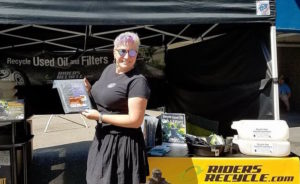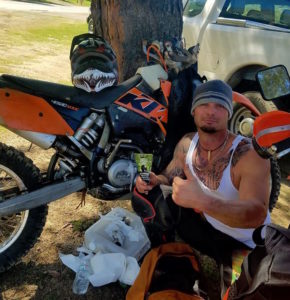Used motor oil, like other household hazardous waste (HHW), can have a lasting negative impact on the environment. Used motor oil from just one oil change can contaminate a million gallons of fresh water – a year’s supply for 50 people. It’s insoluble, persistent, and contains toxic chemicals and heavy metals. Luckily, used oil can be recycled over and over again and saves energy and other resources every time. Used oil filters can also be recycled for the oil that remains inside as well as the steel.

But why target motorcyclists? It turns out they are more likely to change their own oil than the average car owner and will often change the oil on their other vehicles as well. Riders Recycle’s goal is to increase awareness and improve used motor oil and filter recycling among Do-It-Yourself (DIY) motorcyclists. You will find our in-person outreach team at many events throughout the year (especially in the spring and summer). We also get the message out through our Riders Recycle website, social media channels and geo-targeted digital ads. Along the way we’ve learned some important lessons.
The Messenger is Key
Credibility is an important factor in any community, but it’s critical with motorcylists. From cruisers with Harleys to dual-sport adventure riders to dirt bikers and more, motorcylists are quick to notice if you’re not one of them. With several long-time motorcyclists on the Riders Recycle team, they know the right language and tone to use with each of the diverse motorcycle groups. As our team develops better relationships with event promoters, motorcycle retail businesses, race organizers, and off-road-vehicle organizations, we’re able to connect with new motorcycle communities. No matter the audience, it’s important to choose messengers who look like, sound like and ideally come from the communities that you’re trying to reach.
Language Matters

Because our team “speaks the language” of motorcyclists, they’re able to build trust and encounter more receptive attitudes towards the oil and filter recycling message. Even with the aversion to “environmentalist” and “government” messages in some of the motorcycle communities, when our outreach staff take the time to listen to concerns and emphasize common values, most DIYers open up to change, no matter their initial stance. With off-roaders, the message works best when recycling is positioned as a responsibility to the land, community and access for future generations. Efficiency-motivated riders are excited to learn about the technicalities of the oil re-refining and filter recycling processes. It’s wort it to take the time to understand your audience and test language to make sure it resonates with them.
In-person Outreach Works Well for Complex Behaviors
More complex behaviors like oil and filter recycling can benefit from in-person outreach that allows for longer conversations. While social media and digital ads help to reinforce the message, they aren’t always enough for behaviors with several barriers like recycling used oil and filters, reducing food waste or stopping illegal dumping. With in-person outreach, you can communicate why, how and where to do the behavior, give out tools to make it easy, and encourage community ambassadors.
While there are many more lessons we’ve learned in working with this diverse audience and in the HHW world, we’ll leave those for the next blog, including a filter-specific campaign we’re planning based on our research in San Mateo County in 2018. Until then…